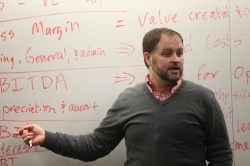MS-MBA Students Teach Professor As Much As He Teaches Them
 Editor’s note: Dr. Mike Gunderson is an associate director for Purdue University’s Center for Food and Agricultural Business and an associate professor of agricultural economics. He leads a quantitative methods course in the center’s MS-MBA in Food and Agribusiness Management dual-degree program. The program is designed specifically for working food and agricultural business professionals around the globe.
Editor’s note: Dr. Mike Gunderson is an associate director for Purdue University’s Center for Food and Agricultural Business and an associate professor of agricultural economics. He leads a quantitative methods course in the center’s MS-MBA in Food and Agribusiness Management dual-degree program. The program is designed specifically for working food and agricultural business professionals around the globe.
I value teaching in the MS-MBA in Food and Agribusiness Management program because I learn. In fact, Dr. Mike Boehlje and I share with new students that if we don’t learn as much from them as they do from us, we will have failed them as instructors.
I have never been comfortable as the “sage on the stage.” I’ve never been satisfied with lecturing for an hour. I don’t see it as my responsibility to “cover material,” but rather to help students uncover insights.
How does this happen in a program where faculty deliver much of the material in online lectures? Although a challenge, we have developed the coursework to promote interaction. Students can watch video demonstrations of using Excel tools. Then these students can work by phone, email, instant message, and video conferencing to connect with program instructors. They can immediately apply the concepts to their own jobs.
I have had students complete a unit in the quantitative analysis course, and then call me with questions regarding how to use those concepts on their own data sets. I have seen students instantly become more effective communicators using data. Students have returned with questions as they work through their capstone projects. They improve on the concepts that they learn to drive change in their organizations through improved data analysis and visual communication.
We also take full advantage of the five in-person residencies. Students challenge the instructors to keep the academic concepts relevant to the business applications. We focus as much of the discussion on challenges facing students as we do on the example case study they use to practice the concepts.
What some might typically consider a “rabbit hole” in a normal class, we use as an opportunity to apply concepts to challenges the students are currently facing. We consider how a modeling technique from the case study can be adapted to a student’s real business dilemma.
Teaching in the MS-MBA is different from the undergraduate teaching that I do. This is partly because it the MS-MBA is offered primarily online and all of my other teaching is in person. But it is largely different because of the audience. The professionals in the MS-MBA program have industry experience under their belts. They are managing people. They are managing production lines with limits on product variance. They are responsible for marketing their companies’ products. The concepts and tools we cover in the MS-MBA program have immediate, practical applicability. We have the opportunity to help these students work through problems in real time.
In the MS-MBA program, faculty can also rely on the students to give the concepts life. Students share their own experiences that illustrate the application of material. In theory, theory and practice are the same. In practice, they are not. Students use their own challenges to note times when this adage holds true. It is the instructors’ jobs to leverage those conversations and prepare students to apply the concepts again.
Learn more about the MS-MBA program
To learn more about earning an MS in agricultural Economics from Purdue University’s College of Agriculture and an MBA from Indiana University’s Kelley School of Business, visit http://agribusiness.purdue.edu/ms-mba-degree. Contact Program Manager Taryn Nance with questions.
Tags: Agribusiness, Food, Food Business, Management, MS-MBA, Quantitative Analysis, students, teaching
MS-MBA Students Teach Professor As Much As He Teaches Them
RELATED POSTS:
Optimizing Sales Management: Knowledge, Coaching and Continuous Improvement
While we used to think that exceptional salespeople possessed an innate gift, recent data suggests the impact of today’s sales managers in nurturing and refining this gift to unlock its fullest potential.
A great moment for value-based sales in agribusiness
Value-based sales can empower companies to craft compelling value propositions, understand the customer’s business model and effectively communicate to stakeholders.
How can big data empower the development of new products?
Data is one of the most powerful resources for a company. It enables accurate decision-making and minimizes risk, ensuring greater revenue and sustainable growth.
